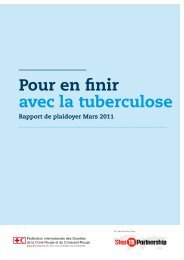Thailand - Stop TB Partnership
Thailand - Stop TB Partnership
Thailand - Stop TB Partnership
You also want an ePaper? Increase the reach of your titles
YUMPU automatically turns print PDFs into web optimized ePapers that Google loves.
epresented in policymaking processes; these groups are most likely to lack higher education,<br />
political access, and allies in policymaking circles. People struggling to stick to a<br />
demanding treatment regimen are more likely to be focused on survival (while they are ill)<br />
and putting the experience behind them (after they are cured) rather than policy debates. Yet<br />
involving people living in the communities most affected by <strong>TB</strong>—especially those who have<br />
successfully completed treatment—is crucial to the development of more effective public<br />
outreach programs and to improving the quality and accessibility of services overall. Given<br />
the marginalization often faced by the people and communities most affected by <strong>TB</strong>, governments<br />
and international donors must take an active role in encouraging and supporting<br />
partnerships with community-based organizations to reach these groups more effectively.<br />
Public-private collaboration<br />
Management of <strong>TB</strong> patients in private practice is not of acceptable quality.<br />
. . . [D]ifferent anti-<strong>TB</strong> regimens are prescribed depending on the<br />
experience of the private provider and on the patient’s purchasing power.<br />
—Report of Third Joint International <strong>TB</strong> DOTS/ HIV/AIDS Monitoring<br />
Mission to Nigeria 42<br />
Many people with <strong>TB</strong> symptoms turn first to private practitioners in their communities, even<br />
in areas theoretically “covered” by governmental DOTS programs. People seek services from<br />
private providers because they lack knowledge about or sufficient access to free treatment,<br />
or because they are looking for better service than they expect to receive at publicly managed<br />
clinics. <strong>TB</strong> treatment regimens in private facilities are often based upon an individual’s purchasing<br />
power rather than on national guidelines for <strong>TB</strong> treatment. In Nigeria, for example,<br />
rather than relying solely on smear tests, private providers use chest x-rays to diagnose <strong>TB</strong><br />
in people who can pay for this service. Widespread reliance on private providers who are not<br />
collaborating with the government also has a negative impact on the accuracy of official <strong>TB</strong><br />
case recording and reporting and the likelihood of treatment default.<br />
While those who can afford it often seek treatment from licensed private medical<br />
doctors, large numbers of <strong>TB</strong> patients seek treatment from a range of other, less qualified<br />
private providers, including traditional healers, pharmacists, and unlicensed doctors, few of<br />
whom can be counted on to follow NTP guidelines. A recent study in Bangladesh found that<br />
up to 70 percent of poor <strong>TB</strong> patients had consulted traditional healers, homeopathic providers,<br />
or allopathic doctors before seeking out DOTS services; 43 because these private providers<br />
charge fees for <strong>TB</strong> services, patients are more likely to appear for treatment only when<br />
they have enough money to buy drugs, or drop out entirely when their money runs out.<br />
Defaulting on treatment increases patients’ risk of developing (and spreading) MDR-<strong>TB</strong>.<br />
22<br />
<strong>TB</strong> POLICY IN THAILAND



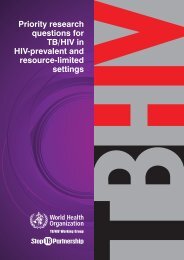

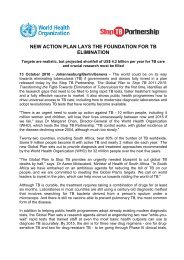
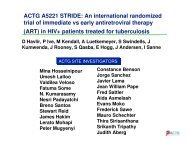
![Global Drug Facility Annual Report 2011 [.pdf] - Stop TB Partnership](https://img.yumpu.com/26788745/1/184x260/global-drug-facility-annual-report-2011-pdf-stop-tb-partnership.jpg?quality=85)

![Concept note on national stop TB partnership [.pdf]](https://img.yumpu.com/26788741/1/184x260/concept-note-on-national-stop-tb-partnership-pdf.jpg?quality=85)

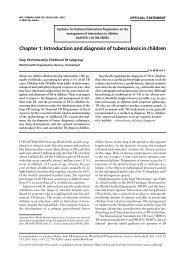
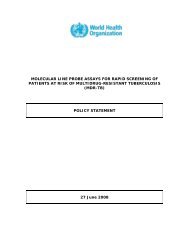
![2005 and Challenges for 2006 - 2015 [.pdf] - Stop TB Partnership](https://img.yumpu.com/26788674/1/190x245/2005-and-challenges-for-2006-2015-pdf-stop-tb-partnership.jpg?quality=85)
![Brochure (French) [.pdf] - Stop TB Partnership](https://img.yumpu.com/17234792/1/190x91/brochure-french-pdf-stop-tb-partnership.jpg?quality=85)

